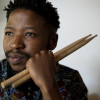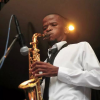Home » Jazz Articles » Album Review » Tumi Mogorosi: Group Theory: Black Music
Tumi Mogorosi: Group Theory: Black Music
There are strong links between the new London and South African scenes. London-based tenor saxophonist and clarinetist Shabaka Hutchings has recorded two albums as leader of the otherwise South African band Shabaka & the Ancestors , and Makhathini and Hutchings have guested on each other's albums. In 2020, London's Brownswood label released the various artists' sampler Indaba Is, which showcased up and coming South African bands including The Ancestors.
Now comes Tumi Mogorosi's Group Theory: Black Music, a joint release by South Africa's Mushroom Hour and London's New Soil labels. Drummer and composer Mogorosi, whose high-impact playing has echoes of both Elvin Jones and Louis Moholo-Moholo, is a member of The Ancestors and South African noiseniks The Wretched, who were also featured on Indaba Is. Mogorosi's core group includes another member of The Ancestors, alto saxophonist Mthunzi Mvubu. The pair are joined by trumpeter Tumi Pheko, guitarist Reza Khota and double bassist Dalisu Ndlazi. The quintet, which is augmented on four tracks by pianist Andile Yenana, has a raw, gritty sound which embraces South Africa's township-jazz heritage and also that of African American spiritual jazz.
So far, so nutritious. But what takes Group Theory: Black Music into its own space is Mogorosi's use of chorale vocals. A powerful choir provides wide-screen soundscapes on all eleven tracks; two of these also feature solo vocalists Siya Mthembu and Gabi Motuba delivering, respectively, male and female reinventions of the American spiritual "Sometimes I Feel Like A Motherless Child." Chorale vocals are in themselves no stranger to jazz, with Max Roach's It's Time (Impulse, 1962), Andrew Hill's Lift Every Voice (Blue Note, 1970) and Billy Harper's Capra Black (Strata-East, 1973) being just three distinguished examples. And chorale vocals are long established in South African jazz as well. Composer Todd Matshikiza's seminal South African jazz opera King Kong made that connection back in 1960.
The vibe of Group Theory: Black Music is, however, altogether heavier than that of King Kong. Portentous going on apocalyptic is more the measure of it. Check the YouTube clip below for the indicative "The Fall," the first single pull.
In the press material accompanying the album, Mogorosi—who used chorale vocals on his debut album, Project ELO (Jazzman, 2014)—writes perceptively about their social and cultural import. Bottom line: he uses them to express the idea of mass, of community, the gathering together of people, and the concomitant political implications. The community Mogorosi has in mind is the global African diaspora—and the direction he believes that it needs to take is mapped out neatly on poet/rapper Lesego Rampolokeng's spitting-fire closer, "Where Are The Keys?"
As Jamaica's Rastafarians were wont to say back in the day when confronted with something weighty such as Culture's "Two Sevens Clash" single, "It dread." Group Theory: Black Music is well dread.
Track Listing
Wadada; The Fall; Panic Manic; 3.15 (Where It's Darkest); Sometimes I Feel Like A Motherless Child; Walk With Me; At The Limit Of The Speakable; Mmama; Thaba Bosiu; Sometimes I Feel Like A Motherless Child; Where Are The Keys?
Personnel
Tumi Mogorosi
drumsTumi Pheko
trumpetMthunzi Mvubu
saxophone, altoReza Khota
guitar, electricDalisu Ndlazi
bass, acousticAdditional Instrumentation
Andile Yenana: piano (4, 5, 9, 11); Siya Mthembu: vocals (5); Gabi Motuba: vocals (10); Lesego Rampolokeng: vocals (track 11); Personnel unknown: choir (1-11), conductor Themba Maseko.
Album information
Title: Group Theory: Black Music | Year Released: 2022 | Record Label: Mushroom Hour / New Soil
Tags
PREVIOUS / NEXT
Support All About Jazz
 All About Jazz has been a pillar of jazz since 1995, championing it as an art form and, more importantly, supporting the musicians who make it. Our enduring commitment has made "AAJ" one of the most culturally important websites of its kind, read by hundreds of thousands of fans, musicians and industry figures every month.
All About Jazz has been a pillar of jazz since 1995, championing it as an art form and, more importantly, supporting the musicians who make it. Our enduring commitment has made "AAJ" one of the most culturally important websites of its kind, read by hundreds of thousands of fans, musicians and industry figures every month.






















